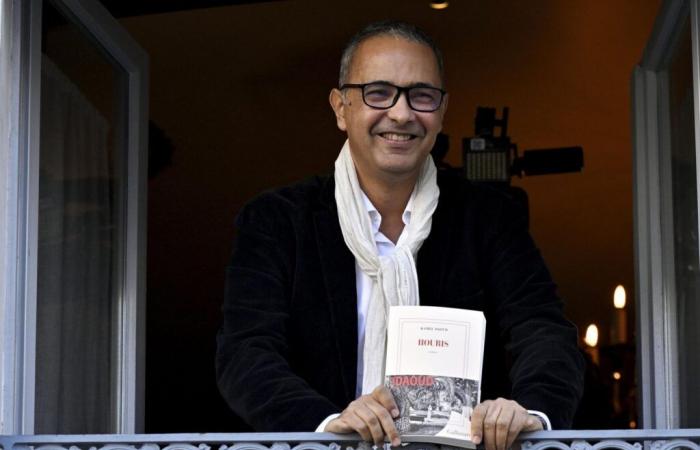Celebrated and consecrated all over the world, the writer Kamel Daoud arouses controversy in Algeria, his country of origin. With each of his appearances, in the French media in particular, the rare spaces of expression still available in the country's private media are transformed into a polemical arena. And the awarding on Monday, November 4 of the Goncourt Prize, the most prestigious of awards for a French-speaking writer, is an opportunity for some to dedicate themselves to criticism “the traitor” who got this way “recognition for one’s allegiance” has “France and Zionism”and others to greet “the child of the country” dedicated thanks to his talent. These are two visions of Algeria that oppose each other.
“Kamel Daoud won the Goncourt. He is thus the first Algerian author to have won this prestigious literary prize. Huge pride. You are Algeria which wins, intelligent Algeria»wrote journalist Hacen Ouali on X, one of the first to react to the consecration of his compatriot.
“By winning, on this historic day of Monday, November 4, 2024, the prestigious Goncourt Prize by six votes out of ten, Kamel Daoud finally breaks the glass ceiling on which Algerian writers, of different generations, with literary genius had hitherto stumbled. indisputable»notes for his part Omar Ouali, another French-speaking journalist who prefers “savour the triumph” by Kamel Daoud.
Dozens of other messages salute the consecration of the author of Hourislike that of the architect Namik Rabia who evokes “a moment of glory” for a writer who is “certainly the most talented of his generation”or the economist Fouad Hakiki. Others were content with the usual “congratulations”.
Two opposing visions of Algeria
But Kamel Daoud does not only have friends in Algeria. Many journalists, writers and the elite – not only Arabic-speaking, quick to vilify and suspect everything that comes from France – see behind this high distinction a political or ideological motivation rather than a literary one.
This is the case of Nassira Belloula. This prolific French-speaking and Berber-speaking writer, who lives between Algeria and Canada, believes that this Goncourt 2024 “does not meet the established literary criteria for which excellence is recognized”. The novel Houris is according to her “a work which suffers from a heaviness which harms its appreciation, the style, the narration and the theme seem to respond to a precise need, which aims to fulfill an expectation”. “This prize presents itself more as a political prize than a literary prize, which emerges from the statements of the author and his interlocutors”she summarizes.
Among the criticisms addressed to Kamel Daoud, his positions against Islamism, on the current war in Gaza – he is criticized for the absence of “condemnation” of the massacre of civilians and a supposed absence of “compassion” towards the victims Palestinian civilians.
But criticism is very rare against the writer's work and more particularly his novel. Houris is not available in Algeria, Éditions Gallimard being banned from the Algiers International Book Fair (Sila) which opens this Wednesday, November 6. A sign of a certain unease in Algerian intellectual circles, the media almost ignored the event apart from a few small informative articles. The authorities also refrained from commenting.
Kamel Daoud, however, did not wait for the last few years and a selection for the Goncourt prize to defend his ideas, notes Amira Bouraoui, political activist and doctor, in reference to the chronicles he wrote for many years in The Daily of Oran. “The nature of Kamel Daoud is to be divisive, analyzes a connoisseur. What is tense is his freedom of tone, particularly on the question of relations with France. He refuses the memorial annuity. »






